
UI for WinUI
WinUI Scheduler
- Fast performance WinUI Scheduler component equipped with data binding capabilities, multi-level grouping, built-in custom views, support for reoccurring appointments, exact rendering, import and export to iCalendar, globalization and localization and more.
- Part of the professionally-designed Telerik UI for WinUI library controls.
- Includes support, documentation, demos, Visual Studio Extensions and more!
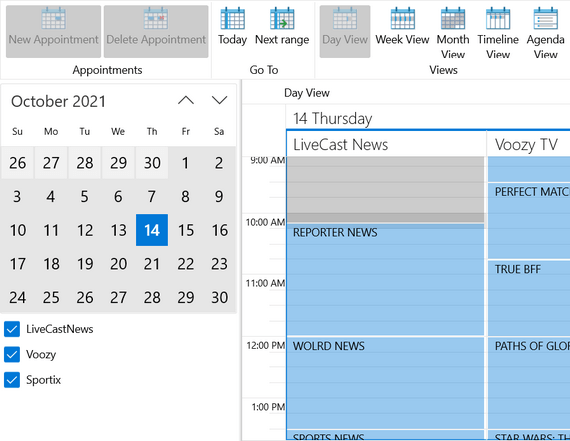
-
Overview
The Scheduler component for WinUI equips the end-user with unprecedented control over precision and flexibility when handling their appointments via a wide range of features such as multi-level grouping, powerful zoom for smart navigation through a large number of appointments, and blazing fast scrolling. This feature-packed control is designed to empower developers to create a powerful scheduling functionality for their WinUI applications.
Visit the Telerik WinUI Scheduler documentation for info on how to get started with the control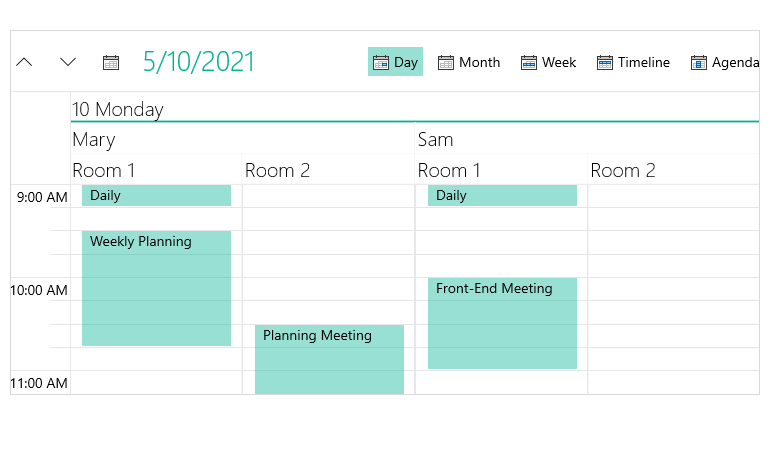
-
Rich User Experience
The Telerik Scheduler control for WinUI allows you to perform various operations in a highly interactive manner. You can easily drag tasks to new time slots or days, filter them based on predicated conditions, resize tasks to change their length, create all-day appointments, or modify them through inline editing.
For more information visit the End User Capabilities section of the product documentation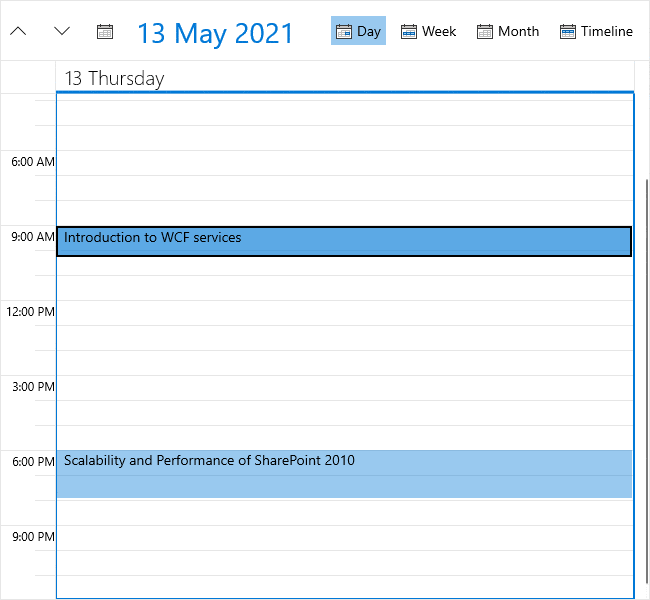
-
Fast Performance
The scrolling of thousands and millions of appointments is made easy and fast with the built-in data-binding capabilities and UI virtualization with container recycling ensure a blazing-fast performance of the Scheduler for WinUI.
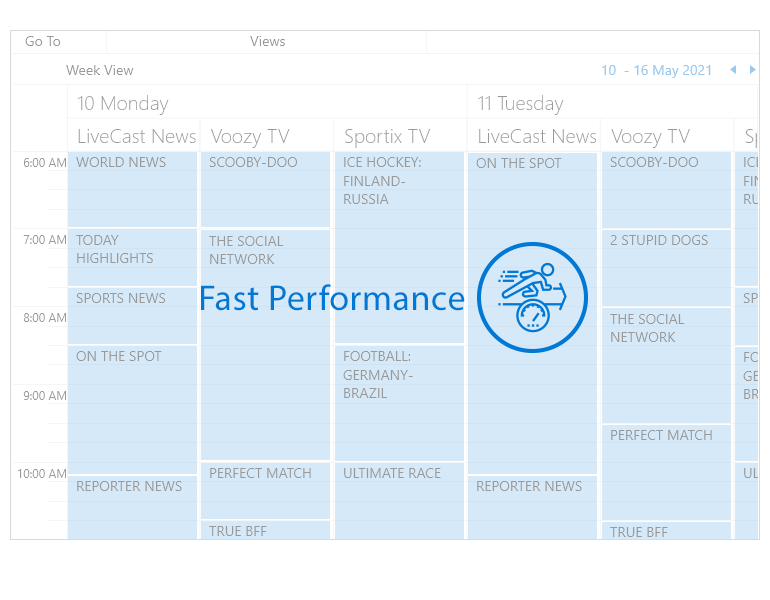
-
Load on Demand
Loading an extensive data set on your WinUI application has its challenges and will oftentimes affect the performance of the app. One of the more common approaches in this scenario is using incremental data loading as additional appointments need to be visualized, on-demand by the user. The Telerik UI for WinUI Scheduler offers a load-on-demand capability that allows you to load the appointments in Scheduler depending on the currently visible range of the control.
Visit the Load on Demand section of the product documentation -
Custom Resources
The WinUI Scheduler comes with a powerful feature that allows you to define custom resources assigned to the appointments. Custom resources enable you to associate additional information with your appointments. For example, you can quickly load the appointments of different users on a single scheduler by simply choosing the user's name from a drop-down menu. The same applies to various other custom resources such as meeting rooms, team events, etc.
Visit the Resources section of the Telerik WinUI Scheduler documentation for more info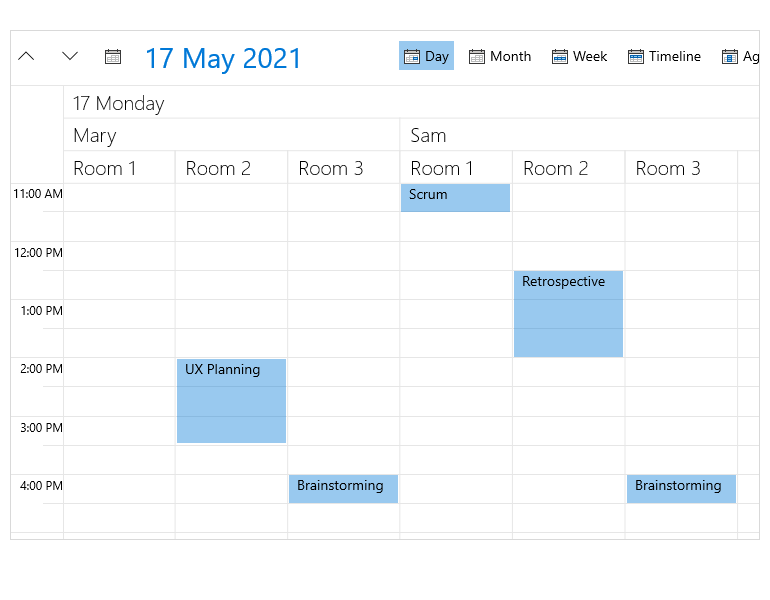
-
Multi-Level Grouping
This feature of the Scheduler for WinUI enables you to display multiple resources, group the appointments accordingly, and assign several resources and group them.
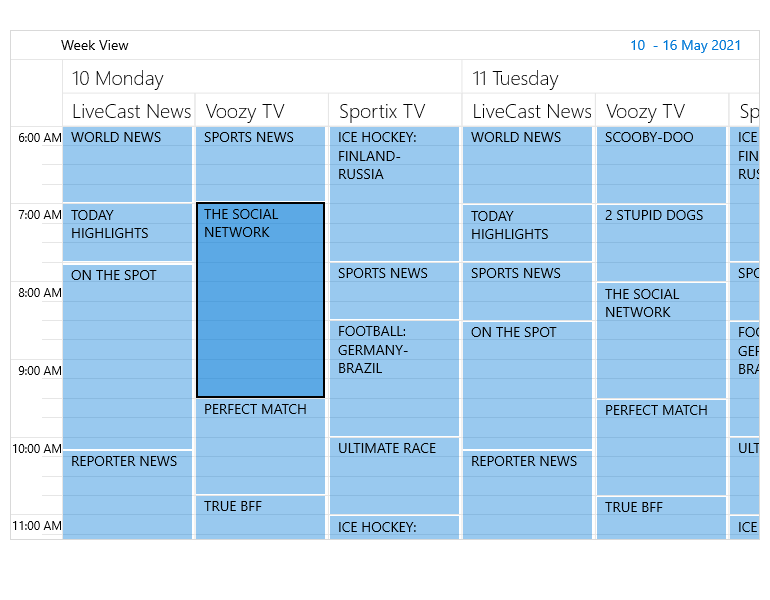
-
Categories
The Telerik UI for WinUI Scheduler comes with built-in support for categories, enabling you to assign a category to each appointment, thus making them more distinguishable. The categories are all color-coded, which allows for better visualization of the appointments.
Visit the product documentation for more information on how to get started with the Telerik WinUI Scheduler
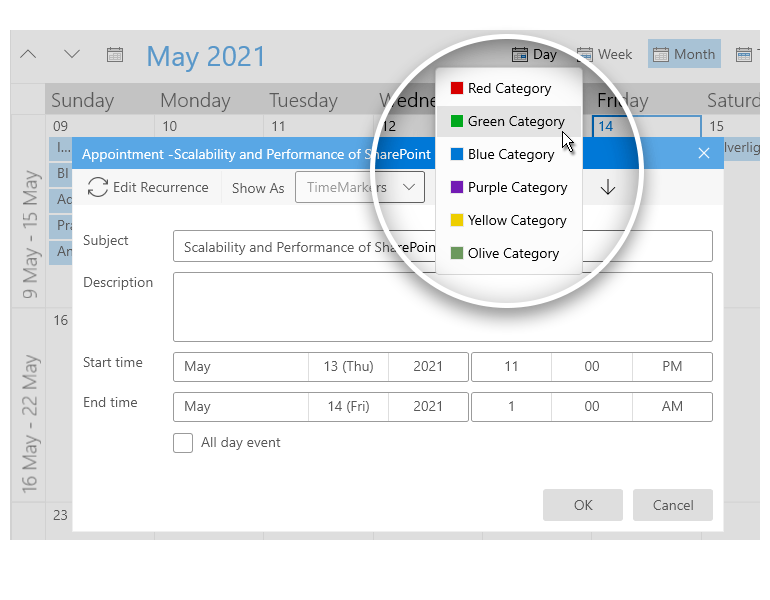
-
Built-in and Custom Views
The Telerik Scheduler for WinUI offers a wide range of built-in view modes such as Day, Week, Month, and Timeline. Additionally, the Scheduler control supports custom views that can be easily implemented based on your application requirements.
Visit the Telerik WinUI Scheduler documentation
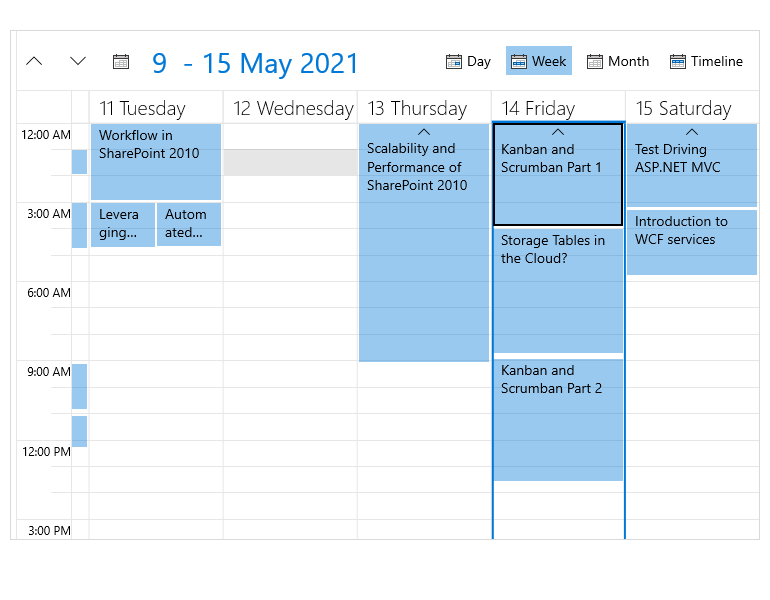
-
Zooming
The zooming functionality of the Telerik Scheduler for WinUI allows the users to easily navigate through the appointments without compromising the fast performance of your application.
Visit the Telerik WinUI Scheduler Documentation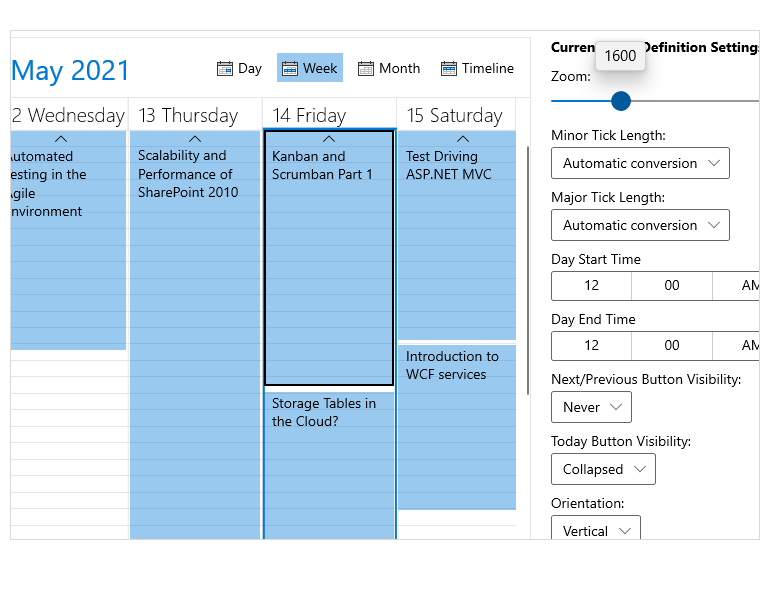
-
Dragging Multiple Appointments
The WinUI Scheduler comes with built-in support for drag-and-drop of multiple appointments at once. Moreover, the improved API allows you to add custom logic to the drag-and-drop operation.
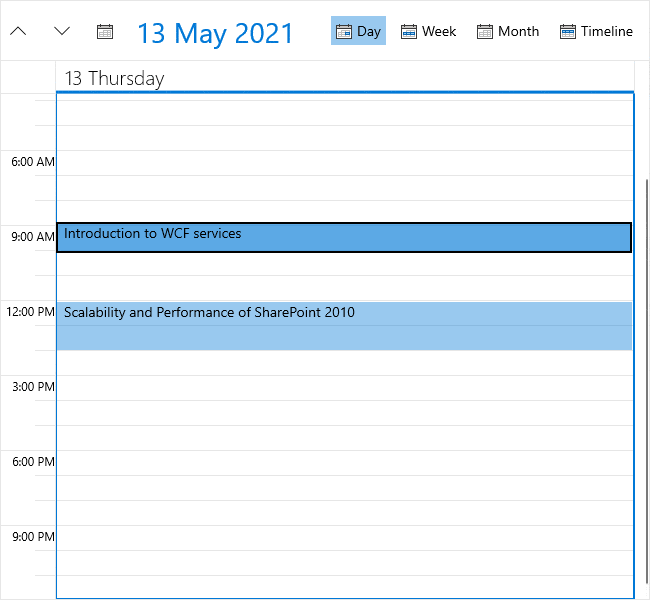
-
Exact Rendering of Appointments
All the appointments in the Telerik Scheduler for WinUI are rendered to see the exact start/finish time of the appointment.
-
Snap Appointments
The WinUI Scheduler provides you with the option to snap the appointments automatically while performing a resizing or drag-and-drop action. Once the action is complete, the appointment will snap according to the size of the defined TimeSlot.
Visit the Snap Appointments section of the product docs for info on how to set the property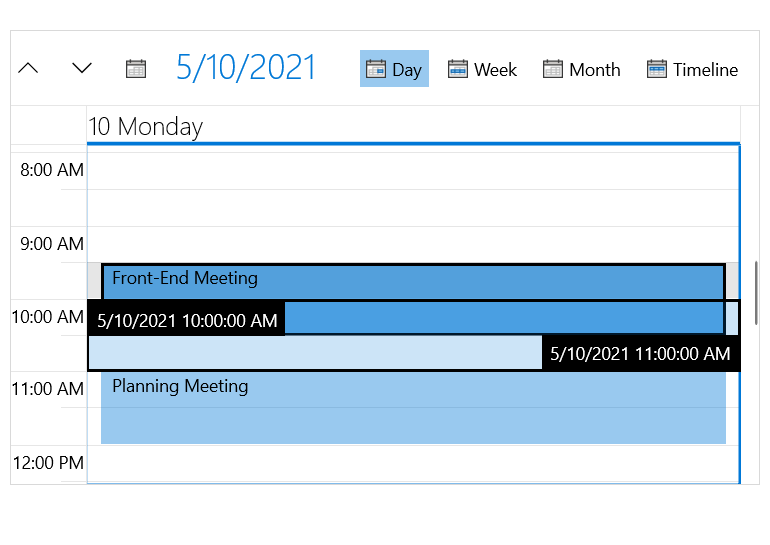
-
Flexible Recurring Appointments Support
A typical scenario for users is having a specific appointment happening more than once at a certain interval of time. With the Telerik WinUI Scheduler control, the end-users of your application can easily set the interval at which an event will happen - be it daily, weekly, monthly, or on a particular day of the month, week, year, and much more.
Check out the Telerik WinUI Scheduler documentation for more information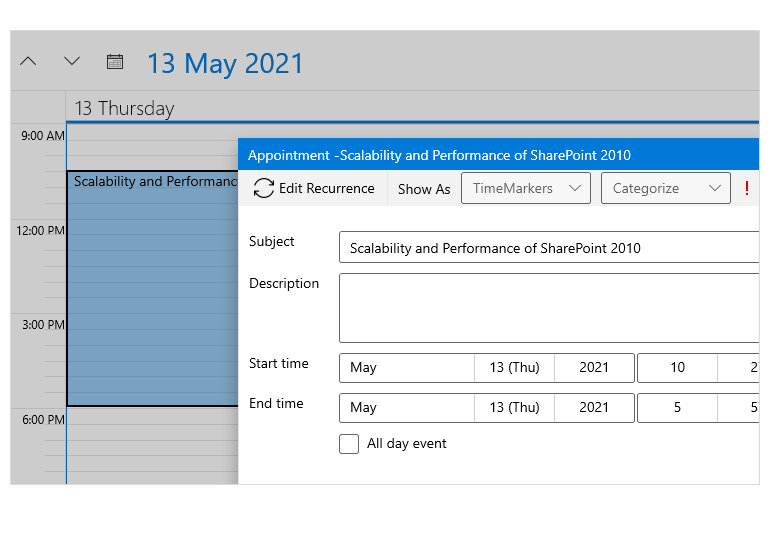
-
Import and Export to iCalendar
The Telerik UI for WinUI Scheduler control supports the importing and exporting of data into iCalendar format.
Visit the Telerik Scheduler for WinUI documentation for more information
All UI for WinUI Components
Data Management
Scheduling
Interactivity & UX
Navigation
Document Processing
